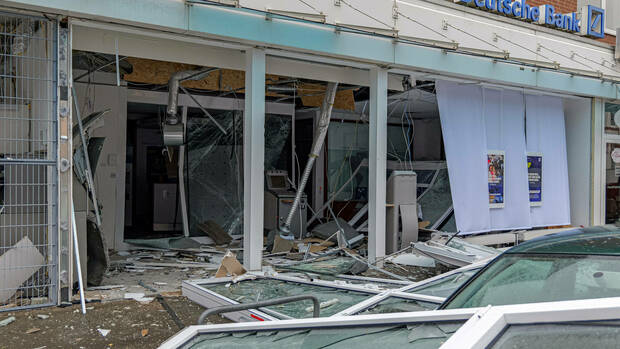When this ATM was blown up in Hanover in March, parts of the Deutsche Bank branch were severely damaged.
(Photo: IMAGO/Bernd Günther)
Frankfurt The Federal Ministry of the Interior sees “first progress” in the efforts of German banks to better protect their ATMs against explosive attacks. “However, we continue to expect very substantial efforts by ATM operators to secure them,” said a ministry spokeswoman on request.
The number of ATM blasts has skyrocketed in the past year. 469 blast attacks were registered, 27 percent more than in 2021. However, not all attacks resulted in the ATMs actually exploding.
It is now becoming apparent that the number of attacks is declining somewhat. In North Rhine-Westphalia there have been 86 attempted and completed demolitions since the beginning of the year, 13 percent fewer than in the same period in 2022, according to the State Criminal Police Office. In Lower Saxony, there were 19 attacks, only about half as many as in the previous year. In Rhineland-Palatinate, on the other hand, the number rose from 23 to 26.
The police assume that most of the crimes are committed by a criminal scene from the Netherlands, which is several hundred strong. The explosive attacks cause enormous property damage. The buildings housing branches and ATM locations are often damaged. Experts consider it a fortunate coincidence that no bystanders have been seriously injured in the attacks, despite the debris and splinters flying around.
In order to put a stop to the perpetrators, the police and politicians also rely on the banks. Representatives of the Ministry of the Interior, the Federal Criminal Police Office and the banking and insurance industry therefore met again on Tuesday. In November 2022, the participants at a “round table” had already declared their willingness to take more protective measures.
New bonding technology is to be used soon
“Banks and savings banks have invested heavily in protection against ATM blasts in recent years and are implementing other extensive measures,” said the German banking industry, the joint lobby of the banks. Many banks no longer grant access to ATMs between 11 p.m. and 6 a.m. and close the anterooms to the branches or self-service foyers.
In addition, the financial institutions often use video transmission systems, demolition and vibration detectors, special security systems for windows and access doors, fogging technology and systems that discolor banknotes in the event of an explosion. This does not seem to bother the perpetrators: they also take discolored banknotes with them.
Savings banks and Volksbanks also want to use a new technology in the future that will make banknotes stick together in a lump in the event of an explosion. However, there are still no special permits for this, for example with a view to occupational safety.
More: Savings banks want to use bonding technology as quickly as possible
